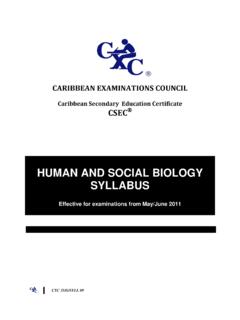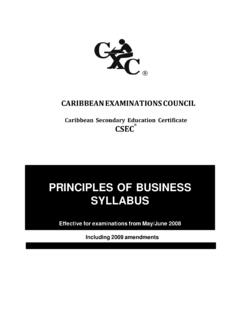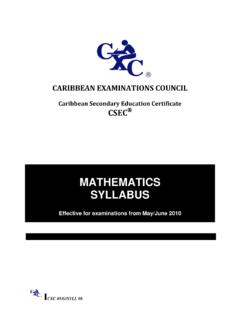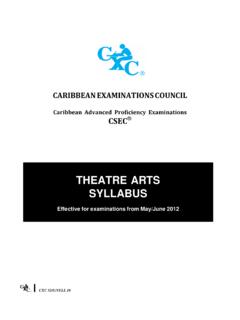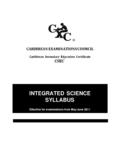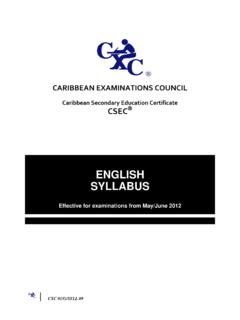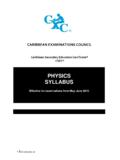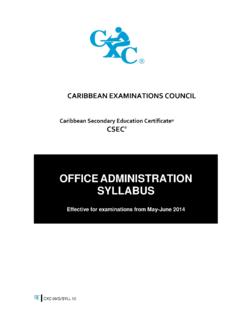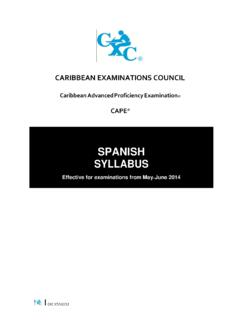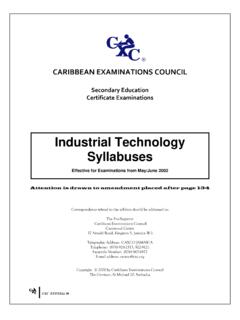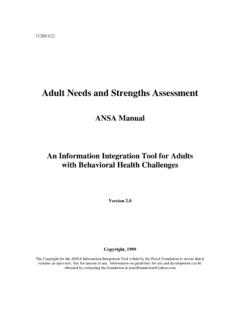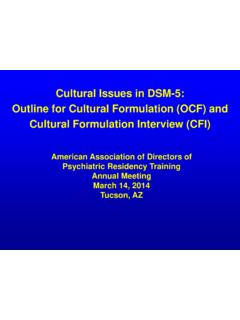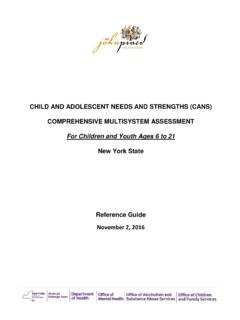Transcription of CARIBBEAN EXAMINATIONS COUNCIL
1 CXC 33/G/SYLL 12 CARIBBEAN EXAMINATIONS COUNCILC aribbean Secondary Education CertificateCSECPHYSICAL EDUCATION AND SPORT SYLLABUSE ffective for EXAMINATIONS from May-June 2014 CXC 33/G/SYLL 12 Published by the CARIBBEAN EXAMINATIONS COUNCIL 2012, CARIBBEAN EXAMINATIONS COUNCIL All rights reserved. No part of this publication may be reproduced, stored in a retrieval system, or transmitted in any form, or by any means electronic, photocopying, recording or otherwise without prior permission of the author or publisher. Correspondence related to the syllabus should be addressed to: The Pro-Registrar CARIBBEAN EXAMINATIONS COUNCIL Caenwood Centre 37 Arnold Road, Kingston 5, Jamaica Telephone Number: +1 (876) 630-5200 Facsimile Number: +1 (876) 967-4972 E-mail Address: Website: Copyright 2012 by CARIBBEAN EXAMINATIONS COUNCIL The Garrison, St Michael BB14038, Barbados CXC 33/G/SYLL 12 Contents RATIONALE.
2 1 AIMS .. 1 CAREER CHOICES .. 2 SUGGESTED 2 CANDIDATE POPULATION .. 2 SUGGESTED TIME-TABLE ALLOCATION FOR TEACHING .. 3 ORGANISATION OF THE SYLLABUS .. 3 CERTIFICATION AND DEFINITION OF PROFILE DIMENSIONS .. 4 FORMAT OF THE EXAMINATIONS .. 5 REGULATIONS FOR PRIVATE CANDIDATES .. 6 REGULATIONS FOR RESIT CANDIDATES .. 6 RECOMMENDED TEACHING TIME AND STRATEGY .. 7 CORE .. 8 OPTIONS .. 13 MARK SCHEME FOR PRACTICAL SKILLS .. 38 SCHOOL-BASED ASSESSMENT .. 40 RESOURCE MATERIAL .. 49 GLOSSARY .. 50 CXC 33/G/SYLL 12 This document CXC 33/G/SYLL 12 replaces CXC 33/0/SYLL 03 issued in 2003. Please note that the syllabus has been revised and amendments are indicated by italics. First issued 2003 Revised 2012 Please check the website for updates on CXC s syllabuses. CXC 33/G/SYLL 12 1 Physical Education and Sport Syllabus RATIONALE Movement is essential for daily functioning.
3 Knowledge of what, where and how the body can move is critical for quality human existence. Physical Education, as an integral part of the general education process, contributes to an individual s awareness and understanding of the elements and dimensions of movement and forms the basis for the learning of sport skills. Sport, on the other hand, is viewed as a vehicle for the enhancement of fundamental motor skills and the development of complex skills learnt through a properly structured Physical Education and Sport programme. It is governed by formal or informal rules that involve competition and may be pursued for recreation or reward while promoting healthy lifestyle practices. Sport is recognised as an instrument for the promotion of international peace and understanding and many local, regional and international sporting bodies have embraced shared values through sport.
4 The study of Physical Education and Sport, therefore, not only allows students to work individually and cooperatively in the theoretical and practical components of the subject but also assists them in developing critical life skills. As a curricular inclusion, it provides students of varying abilities with experiences that facilitate physical, social, intellectual, cultural , spiritual and emotional growth. Skills related to decision-making, problem solving and critical thinking and the use of sport technology are acquired by students undertaking a course of study in Physical Education and Sport. This syllabus will contribute to the development of the Ideal CARIBBEAN Person as articulated by the CARICOM Heads of Government, who has the capacity to create and take advantage of opportunities to control, improve, maintain and promote physical, mental, social and spiritual well-being and to contribute to the health and welfare of the community and country.
5 Although this syllabus is primarily intended to meet the needs of CARIBBEAN students, by providing opportunities for attaining a working knowledge of Physical Education and Sport and its component parts, it may have relevance and appeal at a more universal level. Acquired skills and knowledge can form the basis for further studies in Physical Education and related fields in health, recreation and sport. The syllabus takes into consideration the multicultural nature of CARIBBEAN peoples and consequently endeavours to respond to a wide range of experiences relating to a healthy lifestyle. AIMS The syllabus aims to: 1. develop the knowledge, skills and values for the enhancement of performance in a wide range of movement and sport experiences; 2. promote optimal health and wellness through an understanding of healthy lifestyle practices and regular participation in physical activities; CXC 33/G/SYLL 12 2 3.
6 Develop the capacity for critical and creative thinking, technological competence, problem solving, leadership and cooperative behaviours through authentic learning experiences; 4. Integrate information, communication and technological (ICT) tools and skills. CAREER CHOICES The skills and knowledge acquired through the study of this syllabus may be further developed and employed in a variety of professions including, but not confined to, Physical Education, Games or Sports. The professions include those below. Athlete Sport Administrator Coach Sport Analyst Curriculum Officer Sport Equipment Dealer Dietitian Sport Journalist Exercise Physiologist Sport Announcer Masseur/Masseuse Sport Lawyer Physical Education teacher/lecturer Sport Manager Physical Training Instructor Sport Medicine/Practitioner Physiotherapist Sport Official (referee, umpire, linesman) Research Officer Sport Organiser Sport Agent Sport Psychologist SUGGESTED RESOURCES The following is a suggested list of resources that should be available to schools in their preparation of students for the examination: (a) qualified staff; (b) playing field; (c) hard courts relative to each particular sport selected; (d) gym or access to indoor multi-purpose area; (e) swimming pool or access to community facility for schools that select the swimming activity.
7 (f) basic equipment for each sport and game activity selected; (g) multimedia devices; (h) computer with internet access; (i) resource books and videos of sports, games and other Physical Education content; (j) current international rules and regulations for the respective sports. CXC 33/G/SYLL 12 3 CANDIDATE POPULATION This syllabus is designed for students who intend to pursue further studies in Physical Education and Sport at the tertiary level as well as students whose formal study of the subject is unlikely to proceed further. Students who have benefited from a Physical Education programme equivalent to that undertaken in the first three years of secondary school will be better prepared to undertake this syllabus. It is recommended that no more than twenty (20) students should be included in a class for practical exercises. It is recommended that teachers make the necessary adaptations to cater for candidates with disabilities.
8 SUGGESTED TIME-TABLE ALLOCATION FOR TEACHING It is recommended that a minimum of three hours per week be allocated to the subject over a two-year period. ORGANISATION OF THE SYLLABUS The Physical Education and Sport syllabus is made up of a Compulsory Core and three Options to be completed during the two-year course of study. Each candidate must do the Compulsory Core and three sports from at least two different Options. COMPULSORY CORE OPTIONS SPORTS 1. History and Development of Physical Education and Sport 2. Anatomy and Physiology 3. Fitness and Performance 4. Health and Nutrition 5. Trends and Social Issues A (a) Dance (b) Gymnastics (c) Martial Arts/Combative Sports (d) Swimming (e) Track and Field/Athletics B (a) Badminton (b) Golf (c) Squash (d) Table Tennis (e) Tennis CXC 33/G/SYLL 12 4 COMPULSORY CORE OPTIONS SPORTS C (a) Basketball (b) Cricket (c) Football (d) Hockey (e) Netball (f) Rugby (g) Volleyball (h) Softball/Baseball CERTIFICATION AND DEFINITION OF PROFILE DIMENSIONS The Physical Education and Sport syllabus will be examined at the General Proficiency only.
9 Candidates will be awarded an overall grade reported on a 6-point scale. In addition to the overall grade, candidates performance will be reported by a letter grade under profile dimensions of: Theory and Practical. CXC 33/G/SYLL 12 5 FORMAT OF THE EXAMINATIONS Candidates will be required to take Paper 01, Paper 02, and Paper 03. Paper 01 (2 hours 30 minutes) Theory (90 marks) A compulsory paper based on the Core: History and Development of Physical Education and Sport; Anatomy and Physiology; Fitness and Performance; Health and Nutrition; and Social Issues. Section A: Forty-five (45) compulsory multiple-choice items. This section is worth 45 marks. Section B: Five (5) compulsory structured essay questions. Each question is worth 9 marks. This section is worth 45 marks. Paper 02 (45 minutes) Practical (45 marks) An assessment of practical skills based on ONE of the Options selected by the candidate.
10 Candidates will be required to perform basic and advanced skills chosen from either Option A or Option B or Option C. The assessment will be conducted on-site by an External Examiner appointed by the COUNCIL . In special circumstances, for example, in the absence of a candidate due to illness immediately prior to the examination, or where specialised skills are not available among candidates, the substitution of a non-examination student may be permitted to facilitate the assessment of the registered candidate. Paper 03 School-Based Assessment (165 marks) (a) Class Project (30 marks) During the second, third and fourth terms of the course, each student will be required to undertake a Class Project. Relevant data must be collected and the student s reflections on the activities of the Class Project compiled and submitted in a portfolio for assessment at the end of the fourth term (see pages 39-43 for details of the Class Project).
